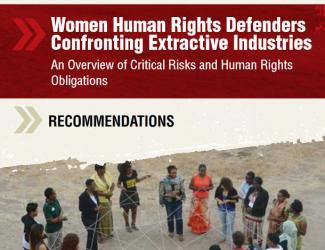In our report on Women Human Rights Defenders confronting extractive industries, AWID and the Women Human Rights Defender International Coalition (WHRDIC) have made the following recommendations in order to contribute towards a safe, enabling environments for WHRDs as they peacefully exercise power and define visions of development for themselves and their communities.
Extractive industries impact women in gender-specific ways: increased violence, additional workload and exclusion from decision-making processes concerning the future of their communities, territories and natural resources.
Women Human Rights Defenders (WHRDs) are resisting extractive operations in pursuit of rights and justice for their communities and in defense of the territories and the environment. By taking action, WHRDs confront corporate power and defy patriarchal gender norms, and as a result, are exposed to an array of gender-specific violations, risks and threats.
Our recommendations
To States and national and transnational corporations
-
Publically recognize the important and legitimate work of WHRDs working in defense of territories and natural resources. Such recognition should extend to WHRDs in all their diversity.
-
Refrain from attacking, harassing and/or intimidating WHRDs who oppose extractive projects including but not limited to physical attacks, smear campaigns, gender-based attacks against WHRDs and their roles in the family and community.
-
Ensure equal participation of WHRDs in decision making concerning control and sustainable development of their territories, natural resources and environment.
-
Develop policies to eliminate obstacles to the participation of WHRDs in decision-making regarding control of their territories, including those barriers based on their gender status, race or ethnicity, economic status or any other real or perceived status or identity.
-
Ensure that both public officials and company officials do not misuse judicial systems to criminalize the legitimate activities of WHRDs who oppose extractive projects in their communities and territories.
-
Ensure respect for the United Nations Guiding Principles on Business and Human Rights, and its use as a minimal standard for developing laws, policies and plans related to operations of extractive industries.
To States
-
Ensure the protection of WHRDs working to defend territories and natural resources, and provide an enabling environment free from violence in accordance with international human rights standards.
-
Investigate thoroughly and independently violations against WHRDs by all perpetrators, and ensure that such violations do not go unpunished. The State should provide victims with access to effective judicial remedies and reparation.
-
Participate constructively in developing a binding treaty on business and human rights, and ensure the necessary conditions for WHRDs to participate in the negotiations of this treaty.
-
Ensure that contractual engagements between state authorities and corporations do not violate the rights of communities and human rights defenders, and safeguard the right to defend rights.
-
Effectively freeze extractive operations contested by any community and ensure that an effective dispute resolution process is held.
-
Ensure that bilateral and multilateral trade agreements safeguard human rights and include protection of WHRDs, communities and the environment and incorporate mechanisms that provide remedy for violations.
-
Develop and strengthen statutory regulation of private security actors in line with international human rights standards, and establish appropriate reporting mechanisms for complaints of violations, including both the threat and the occurrence of violence and sexual assault, committed by such actors.
To national and transnational companies
-
Ensure that free, prior and informed consent is received from all sections of the affected community, for all prospective extractive operations, and withdraw from operations resisted by the community.
-
Ensure that the conduct of private security actors employed by the company is in line with international human rights standards, including the Voluntary Principles on Security and Human Rights, and establish appropriate reporting mechanisms for complaints of violations committed by such actors.
To regional and international mechanisms to protect human rights
-
Monitor and document violations against WHRDs, their organizations and movements working to defend territories and natural resources, and generate information on violence and gender-specific impacts against WHRDs.
-
Integrate a gender perspective into reports, resolutions, recommendations and other workrelated documents, and in the protection of HRDs working to defend territories and the environment .
-
Make specific recommendations to states and companies so that they respect and fulfill human rights obligations and contribute to an enabling environment for human rights defenders.
To Donors
-
Provide long-term support to WHRDs and women’s organizing through flexible multi-year funding, including core and emergency funds, which can be used for integrated security measures and building institutional capacity, networks and outreach.
-
Allocate resources to support WHRDs facing criminalization and judicial processes. These resources should not only be designed to cover legal costs, but also other costs related to legal processes such as transport, accommodation and costs related to the care of the family.
-
Support women and community initiatives advancing feminist and alternative visions and models of development
Explore more!
These new resources are part of a participatory research project on “Women Human Rights Defenders confronting extractivism and corporate power” co-led by AWID and Women Human Rights Defenders International Coalition (WHRD-IC).
It is designed as a toolbox for learning, awareness raising, advocacy and resistance:
-
Video: “Defending people and planet: Women confronting extractive industries”
-
Practical guide: "Weaving resistance through action: Strategies of Women Human Rights Defenders confronting extractive industries"
-
Policy report: "Women Human Rights Defenders confronting extractive industries: an overview of critical risks and Human Rights obligations"
This report published in April, outlines policy recommendations to end corporate impunity, stop state and non-state violence against WHRDs, and ensure WHRDs can continue their critical work.
Explore our Special Focus section: Confronting extractivism and corporate power
Share your experience and questions!
◾️ How can these resources support your activism and advocacy?
◾️ What additional information or knowledge do you need to make the best use of these resources?
